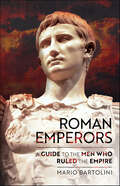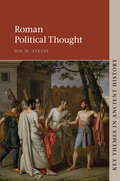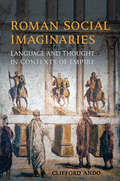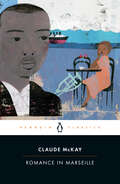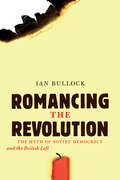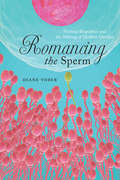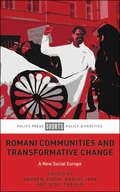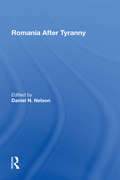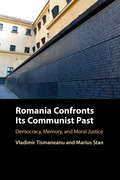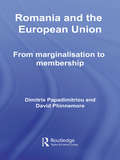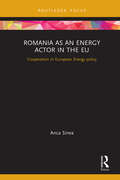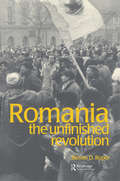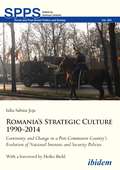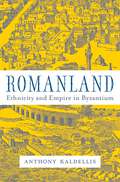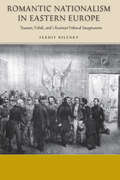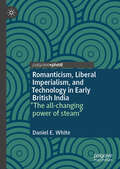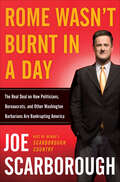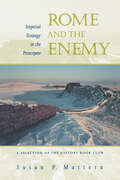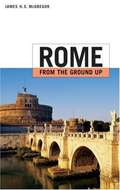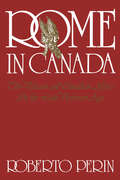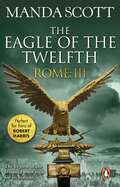- Table View
- List View
Roman Emperors: A Guide to the Men Who Ruled the Empire
by Mario BartoliniRoman Emperors is a concise chronological guide to the emperors who ruled the Roman Empire. It covers the period from the establishment of the Empire by Augustus in 27 BCE to the abdication of Romulus Augustus in 476 CE, an event that marks the official end of the existence of the Roman Empire as a political entity in Western Europe. After a useful introduction to the late Republic and its transformation into the Empire, each of the eighty-five emperors customarily recognized as legitimate are presented in the order in which they reigned. This includes both Eastern and Western emperors for those periods where the empire was divided, and each one is illustrated. A useful glossary of technical terms is also provided.
Roman Law in the State of Nature
by Benjamin Straumann Belinda CooperRoman Law in the State of Nature offers a new interpretation of the foundations of Hugo Grotius' natural law theory. Surveying the significance of texts from classical antiquity, Benjamin Straumann argues that certain classical texts, namely Roman law and a specifically Ciceronian brand of Stoicism, were particularly influential for Grotius in the construction of his theory of natural law. The book asserts that Grotius, a humanist steeped in Roman law, had many reasons to employ Roman tradition and explains how Cicero's ethics and Roman law – secular and offering a doctrine of the freedom of the high seas – were ideally suited to provide the rules for Grotius' state of nature. This fascinating new study offers historians, classicists and political theorists a fresh account of the historical background of the development of natural rights, natural law and of international legal norms as they emerged in seventeenth-century early modern Europe.
Roman Political Thought
by Dean HammerRoman Political Thought is the first comprehensive treatment of the political thought of the Romans. Dean Hammer argues that the Romans were engaged in a wide-ranging and penetrating reflection on politics. The Romans did not create utopias. Instead, their thinking was relentlessly shaped by their own experiences of violence, the enormity and frailty of power, and an overwhelming sense of loss of the traditions that oriented them to their responsibilities as social, political, and moral beings. However much the Romans are known for their often complex legal and institutional arrangements, the power of their political thought lies in their exploration of the extra-institutional, affective foundations of political life. The book includes chapters on Cicero, Lucretius, Sallust, Virgil, Livy, Seneca, Tacitus, Marcus Aurelius, and Augustine and discussions of Polybius, the Stoics, Epicurus, and Epictetus.
Roman Political Thought (Key Themes In Ancient History)
by Jed W. AtkinsWhat can the Romans teach us about politics? <P><P>This thematic introduction to Roman political thought shows how the Roman world developed political ideas of lasting significance, from the consequential constitutional notions of the separation of powers, political legitimacy, and individual rights to key concepts in international relations, such as imperialism, just war theory, and cosmopolitanism. Jed W. Atkins relates these and many other important ideas to Roman republicanism, traces their evolution across all major periods of Roman history, and describes Christianity's important contributions to their development. Using the politics and political thought of the United States as a case study, he argues that the relevance of Roman political thought for modern liberal democracies lies in the profound mixture of ideas both familiar and foreign to us that shape and enliven Roman republicanism. Accessible to students and non-specialists, this book provides an invaluable guide to Roman political thought and its enduring legacies.<P> Shows how the Romans contributed to key political ideas of lasting importance and provides a comprehensive account of Roman 'republicanism'.<P> Includes introductions to all periods of Roman history, key Roman authors, and relevant scholarship in the fields of political theory, Roman history, ancient philosophy, Latin literature, and early Christian studies.<P> Suggests how Roman political thought is applicable to modern liberal democracies, focusing on the United States as a case-study.
Roman Social Imaginaries
by Clifford AndoIn an expansion of his 2012 Robson Classical Lectures, Clifford Ando examines the connection between the nature of the Latin language and Roman thinking about law, society, and empire. Drawing on innovative work in cognitive linguistics and anthropology, Roman Social Imaginaries considers how metaphor, metonymy, analogy, and ideation helped create the structures of thought that shaped the Roman Empire as a political construct.Beginning in early Roman history, Ando shows how the expansion of the empire into new territories led the Romans to develop and exploit Latin's extraordinary capacity for abstraction. In this way, laws and institutions invented for use in a single Mediterranean city-state could be deployed across a remarkably heterogeneous empire.Lucid, insightful, and innovative, the essays in Roman Social Imaginaries constitute some of today's most original thinking about the power of language in the ancient world.
Romance in Marseille
by Claude McKayThe pioneering novel of physical disability, transatlantic travel, and black international politics. A vital document of black modernism and one of the earliest overtly queer fictions in the African American tradition. Published for the first time. <P><P>A Penguin Classic <P><P>Buried in the archive for almost ninety years, Claude McKay's Romance in Marseille traces the adventures of a rowdy troupe of dockworkers, prostitutes, and political organizers--collectively straight and queer, disabled and able-bodied, African, European, Caribbean, and American. Set largely in the culture-blending Vieux Port of Marseille at the height of the Jazz Age, the novel takes flight along with Lafala, an acutely disabled but abruptly wealthy West African sailor. While stowing away on a transatlantic freighter, Lafala is discovered and locked in a frigid closet. Badly frostbitten by the time the boat docks, the once-nimble dancer loses both of his lower legs, emerging from life-saving surgery as what he terms "an amputated man." Thanks to an improbably successful lawsuit against the shipping line, however, Lafala scores big in the litigious United States. Feeling flush after his legal payout, Lafala doubles back to Marseille and resumes his trans-African affair with Aslima, a Moroccan courtesan. <P><P>With its scenes of black bodies fighting for pleasure and liberty even when stolen, shipped, and sold for parts, McKay's novel explores the heritage of slavery amid an unforgiving modern economy. This first-ever edition of Romance in Marseille includes an introduction by McKay scholars Gary Edward Holcomb and William J. Maxwell that places the novel within both the "stowaway era" of black cultural politics and McKay's challenging career as a star and skeptic of the Harlem Renaissance.
Romancing the Revolution: The Myth of Soviet Democracy and the British Left
by Ian BullockOver two decades have passed since the collapse of the USSR, yet the words "Soviet Union" still carry significant weight in the collective memory of millions. But how often do we consider the true meaning of the term "Soviet"? Drawing extensively on left-wing press archives, Romancing the Revolution traces the reactions of the British Left to the idealized concept of Soviet democracy. Focusing on the turbulent period after the 1917 Russian Revolution, author Ian Bullock examines the impact of the myth of Soviet democracy: the belief that Russia was embarking on a brave experiment in a form of popular government more genuine and advanced than even the best forms of parliamentarism. Romancing the Revolution uncovers the imprint of this myth on left-wing organizations and their publications, ranging from those that presented themselves as "British Bolsheviks"—the British Socialist party and The Call, the Socialist Labour party's The Socialist, Sylvia Pankhurst's Workers' Dreadnought—to the much more equivocal Labour Leader and The New Statesmen.
Romancing the Sperm: Shifting Biopolitics and the Making of Modern Families
by Diane ToberThe 1990s marked a new era in family formation. Increased access to donor sperm enabled single women and lesbian couples to create their families on their own terms, outside the bounds of heterosexual married relationships. However, emerging “alternative” families were not without social and political controversy. Women who chose to have children without male partners faced many challenges in their quest to have children. Despite current wider social acceptance of single people and same sex couples becoming parents, many of these challenges continue. In Romancing the Sperm, Diane Tober explores the intersections between sperm donation and the broader social and political environment in which “modern families” are created and regulated. Through tangible and intimate stories, this book provides a captivating read for anyone interested in family and kinship, genetics and eugenics, and how ever-expanding assisted reproductive technologies continue to redefine what it means to be human.
Romani Communities and Transformative Change: A New Social Europe
by Andrew Ryder, Marius Taba and Nidhi TrehanAvailable Open Access under CC-BY-NC-ND. Drawing on Roma community voices and expert research, this book provides a powerful tool to challenge conventional discourses and analyses on Romani identity, poverty and exclusion. Through the transformative vehicle of a ‘Social Europe’, this edited collection presents new concepts and strategies for framing social justice for Romani communities across Europe. The vast majority of Roma experience high levels of exclusion from the labour market and from social networks in society. This book maps out how the implementation of a new ‘Social Europe’ can offer innovative solutions to these intransigent dilemmas. This insightful and accessible text is vital reading for the policymaker, practitioner, academic and activist.
Romania After Tyranny
by Daniel N NelsonIn 1973, Romanians were beginning to recognize that the regime of Nicolae Ceausescu, contrary to what his first five or six years in power seemed to imply, would bring no respite from communism. Instead, after a 1971 "mini cultural revolution" ended hope for a Bucharest "spring" and intellectual latitude was curtailed further in 1972-73, the ominous possibilities of Ceausescu were becoming evident. In 1973, I went to Romania on a dissertation research grant from the International Research and Exchanges Board. It was a year in which wide-ranging survey research was still possible. But it was also a time when historians and writers who had different ideas, or workers who gave thought to non-party union organization, felt the heavy hand of Ceausescu's Securitate. As happens to most graduate students and their field research, it was a formative experience with indelible impressions that remain today.
Romania Confronts Its Communist Past: Democracy, Memory, And Moral Justice
by Vladimir Tismaneanu Marius StanReckoning with mass crimes perpetrated by an ideologically driven regime entails engaging in a thorough-going exploration of its utopian foundations. In the case of Romania, such an analysis requires an interpretation of the role of personality in the construction of a uniquely grotesque and unrepentant form of neo-Stalinist despotism. <P><P>Of all the revolutions of 1989, the only violent one took place in Romania. Confronting its communist past therefore involves addressing the abuses committed by the communist regime up to its very last day, its failure to engage in Round Table-type agreements with democratic representatives, and the repression during the first post-communist years, a direct legacy of the old regime. This book shows how moral justice can contribute to a restoration of truth and a climate of trust in politics, in the absence of which any democratic polity remains exposed to authoritarian attack.<P> Highlights the challenges of addressing a nation's traumatic past through a revealing case study and comparative perspective.<P> Offers unique insight into the political psychology of post-communist states.<P> Co-authored by Vladimir Tismaneanu, the Chair of the Presidential Commission for the Analysis of the Communist Dictatorship in Romania, whose Final Report was the basis for President Băsescu's condemnation of the communist dictatorship as illegitimate and criminal.
Romania and The European Union: From Marginalisation to Membership? (Europe and the Nation State #Vol. 12)
by Dimitris Papadimitriou David PhinnemoreThis book explores the dynamics behind Romania’s relationship with the European Union from the collapse of the Ceaucescu regime in 1989, to its recent accession to the EU in 2007. As a completely up-to-date and detailed study, it identifies key developments in EU-Romania relations, as well as the challenges Romania faced in its efforts move from the margins of the European integration to EU membership. In so doing, the analysis contributes to wider debates about the dynamics underpinning EU enlargement. Moreover, the book reveals the consequences and limits of Europeanization. Romania and the European Union analyses: the impact of integration on the consolidation of democracy in Romania; the country’s economic development, in accordance with the EU’s Copenhagen criterion - the need for acceding states to possess a ‘functioning market economy’; the process of macroeconomic reform; the reform of its public administration; the country’s efforts in implementing the EU’s acquis in the areas of justice and home affairs –a focal point in the accession negotiations given Romania’s geographical location, and its vulnerability as a major transit point for illegal migration and trafficking into the EU – and securing its external borders; the EU’s role in promoting reform as well as the limits of EU influence the obstacles Romania has had to overcome in meeting the demanding pre-requisites of accession to the EU. This book identifies the EU’s role in promoting reform, but equally the limits of EU influence. It reveals the obstacles Romania has had to overcome in meeting the demanding pre-requisites of accession to the EU.
Romania and the Quest for European Identity: Philo-Germanism without Germans (Southeast European Studies)
by Cristian CercelExploring the largely positive representations of Romanian Germans predominating in post-1989 Romanian society, this book shows that the underlying reasons for German prestige are strongly connected with Romania’s endeavors to become European. The election, in 2014, of Klaus Iohannis as Romania’s president was hailed as evidence that the country chose a 'European’ future: that Iohannis belonged to Romania’s tiny German minority was also considered to have played a part in his success. Cercel argues that representations of Germans in Romania, descendants of twelfth-century and eighteenth-century colonists, become actually a symbolic resource for asserting but also questioning Romania’s European identity. Such representations link Romania’s much-desired European belonging with German presence, whilst German absence is interpreted as a sign of veering away from Europe. Investigating this case of discursive "self-colonization" and this apparent symbolic embrace of the German Other in Romania, the book offers a critical study of the discourses associated with Romania’s postcommunist "Europeanization" to contribute a better understanding of contemporary West-East relationships in the European context. This fresh and insightful approach will interest postgraduates and scholars interested in Central, Eastern and Southeastern Europe and in German minorities outside Germany. It should also appeal to scholars of memory studies and those interested in the study of otherness in general.
Romania as an Energy Actor in the EU: Cooperation in European Energy policy (Europa Perspectives on the EU Single Market)
by Anca SineaThe purpose of this book is twofold. First, it aims to explain the general framework for cooperation in the energy sector in Europe, with a conceptual basis that allows for a better understanding of the dynamics that led to its existence. Second, the volume deals with Romania both as a representative case for the region, given the commonalities raised by the transition process in the last three decades, and also as a country with a specific energy agenda, with implications for internal and foreign policy that can only be perceived and understood in the Romanian context.
Romania: The Unfinished Revolution (Postcommunist States and Nations)
by Stephen D. RoperThe Romanian revolution was motivated by a desire for greater political and intellectual freedom and economic prosperity. It was the bloodiest of the eastern European transitions due to Ceausescu's cult of personality. However, many of the goals of the revolution are still unfulfilled. The lack of civil society, charges of political corruption, the failure to transform the economy, and concerns over the protection of ethnic minority rights are all factors in Romania's failure to become a fully integrated European country. Tracing the country's political history and examining Romania's postcommunist politics, economic transition and foreign policy, this book contemplates the prospects for this country as it enters the twenty first century.
Romania’s Strategic Culture 1990–2014: Continuity and Change in a Post-Communist Country’s Evolution of National Interests and Security Policies (Soviet and Post-Soviet Politics and Society #202)
by Iulia-Sabina JojaAnalysis of strategic culture facilitates a comprehensive understanding of a nation’s security identity and patterns of policy conduct. Though strategic culture changes over time, why and how these mutations take place has not been researched much so far. This book sheds light on the reasons why specific features of a country’s strategic thinking remain rigid while others transform.The national strategic cultures of postcommunist Eastern Europe have been exposed to a panoply of shocks and shifts. Romania’s communist regime cultivated a uniquely thorny relationship with the Soviet Union, which facilitated the development of a national security narrative legitimizing a highly isolationist foreign policy. These factors have heavily weighed on Romanian post-communist strategic thinking and complicated the transition process. At first glance, Romania went through an astonishing adaptation to novel security challenges. Ultimately, however, its traditional national strategic thinking remained in some ways constant. Core features of Romania’s strategic culture—such as the state-nation constellation—were the most resilient to change. In contrast, the intermediary features—such as the understanding of security and role conception—as well as outer layers—such as the foreign policy orientation and guidelines to using force—of strategic culture were more prone to influence by shocks, shifts, and norm entrepreneurs.
Romanland: Ethnicity and Empire in Byzantium
by Anthony KaldellisWas there ever such a thing as Byzantium? Certainly no emperor ever called himself Byzantine. While the identities of eastern minorities were clear, that of the ruling majority remains obscured behind a name made up by later generations. Anthony Kaldellis says it is time for the Romanness of these so-called Byzantines to be taken seriously.
Romantic Nationalism in Eastern Europe: Russian, Polish, and Ukrainian Political Imaginations
by Serhiy BilenkyThis book explores the political imagination of Eastern Europe in the 1830s and 1840s, when Polish, Russian, and Ukrainian intellectuals came to identify themselves as belonging to communities known as nations or nationalities. Bilenky approaches this topic from a transnational perspective, revealing the ways in which modern Russian, Polish, and Ukrainian nationalities were formed and refashioned through the challenges they presented to one another, both as neighboring communities and as minorities within a given community. Further, all three nations defined themselves as a result of their interactions with the Russian and Austrian empires. Fueled by the Romantic search for national roots, they developed a number of separate yet often overlapping and inclusive senses of national identity, thereby producing myriad versions of Russianness, Polishness, and Ukrainianness.
Romanticism, Liberal Imperialism, and Technology in Early British India: “The all-changing power of steam”
by Daniel E. WhiteConsidering metropolitan and colonial cultural production as a “unitary field of analysis,” this book shows how tensions in the 1830s between utilitarian and Romantic perspectives on steam power marked meaningful divisions within the pervasive liberal imperialism of the period and generated divergent speculative fantasies, set in the twentieth and twenty-first centuries, about the future of Indian nationalism. Poetry and fiction in Britain and Bengal engage with a Romantic strain of thought and sentiment according to which steam technology represents an anti-utilitarian humanization of nature. Within and against that frame and in uneven and different ways, writers in British India map a constellation of liberal values onto their hopes and fears concerning a future powered by steam.
Rome Wasn't Burnt in a Day: The Real Deal on How Politicians, Bureaucrats, and Other Washington Barbarians Are Bankrupting America
by Joe ScarboroughThe former Republican congressman and now host of MSNBC’s “Scarborough Country” wittily presents The Real Deal—that Democrats and Republicans are indistinguishable: equally adept at pillaging and pork-barrelling your tax dollars—and he offers some solutions to the problemThey get themselves elected as “Washington outsiders”— Barbarians at the Gate. Once inside, however, these Vandals and Visigoths swiftly shed their pelts, don their togas, and heartily set about the business-as-usual of Our Perpetual Imperial Congress—fiddling while your tax dollars burn. Meanwhile, a Republican president and self-proclaimed conservative, George W. Bush, while mooning over Mars, has grown the federal government by a staggering 10.5% (Bill Clinton exited office at a disgraceful 3.4%). Welcome to the Orwellian “Animal Farm”-world of U.S. politics, as only Joe Scarborough can explain it from his unique perspective inside “Scarborough Country.”From his unseating of an entrenched Democratic congressman in 1994 as part of the Gingrich Revolution, to his leadership role in the overthrow of Gingrich himself, to his rise as one of America’s most respected and entertaining political and cultural commentators as host of MSNBC’s top-rated “Scarborough Country,” Joe Scarborough has consistently surprised friend and foe alike. Is he a conservative? Most certainly. Is he a Republican? Yes. Does that mean that the president, his oil-cabal cronies, and other false claimants to conservatism should get a pass? Certainly not.In Rome Wasn’t Burnt in a Day, Scarborough recounts his own political awakening within the Imperial Congress; provides profound and shocking insight into what is really happening inside Washington today; and offers solutions to our present dilemma that will appeal to all intelligent readers — be they conservatives, liberals, libertarians, or folks just plain fed up with all the labels and all the lies.
Rome and the Enemy: Imperial Strategy in the Principate
by Susan P. MatternHow did the Romans build and maintain one of the most powerful and stable empires in the history of the world? This illuminating book draws on the literature, especially the historiography, composed by the members of the elite who conducted Roman foreign affairs. From this evidence, Susan P. Mattern reevaluates the roots, motivations, and goals of Roman imperial foreign policy especially as that policy related to warfare. In a major reinterpretation of the sources, Rome and the Enemy shows that concepts of national honor, fierce competition for status, and revenge drove Roman foreign policy, and though different from the highly rationalizing strategies often attributed to the Romans, dictated patterns of response that remained consistent over centuries.Mattern reconstructs the world view of the Roman decision-makers, the emperors, and the elite from which they drew their advisers. She discusses Roman conceptions of geography, strategy, economics, and the influence of traditional Roman values on the conduct of military campaigns. She shows that these leaders were more strongly influenced by a traditional, stereotyped perception of the enemy and a drive to avenge insults to their national honor than by concepts of defensible borders. In fact, the desire to enforce an image of Roman power was a major policy goal behind many of their most brutal and aggressive campaigns.Rome and the Enemy provides a fascinating look into the Roman mind in addition to a compelling reexamination of Roman conceptions of warfare and national honor. The resulting picture creates a new understanding of Rome's long mastery of the Mediterranean world.
Rome and the Making of a World State, 150 BCE – 20 CE
by Josiah OsgoodIn the century following 150 BCE, the Romans developed a coherent vision of empire and a more systematic provincial administration. The city of Rome itself became a cultural and intellectual center that eclipsed other Mediterranean cities, while ideas and practices of citizenship underwent radical change. <P><P>In this book, Josiah Osgood offers a new survey of this most vivid period of Roman history, the Late Republic. While many discussions focus on politics in the city of Rome itself, his account examines developments throughout the Mediterranean and ties political events more firmly to the growth of overseas empire. The volume includes a broad overview of economic and cultural developments. By extending the story well beyond the conventional stopping date of Julius Caesar's assassination in 44 BCE, Osgood ultimately moves away from the old paradigm of the fall of the Republic. The Romans of the Late Republic emerge less as the disreputable gangsters of popular imagination and more as inspired innovators.<P> Offers a new, more positive view of the Late Roman Republic, challenging the entrenched idea that the Late Republic was a period of inexorable decline,<P> Gives a clear narrative of political history while also introducing major economic and cultural developments, allowing students to learn of up-to-date research in the field and the different approaches historians take,<P> Provides many maps and illustrations, demonstrating how material evidence is important for our understanding of Roman history.
Rome from the Ground Up
by James H. S. McgregorBeginning with the ground on which Rome first rose, this book conjures past and present cities, conducting the reader through time and space to the complex and shifting realities--architectural, historical, political, and social--that constitute Rome.
Rome in Canada: The Vatican and Canadian Affairs in the Late Victorian Age
by Roberto PerinIn the three decades after Confederation, an aggressive Anglo-Saxon nationalism struggled to imprint its cultural model on the emerging Canadian state. It was countered by a defensive French-Canadian nationalism chiefly articulated by a majority within the Roman Catholic clergy. In this study Roberto Perin explores the role of the Vatican in this struggle, and in the political, religious, and cultural life of Canada during this period.
Rome: (Rome 3): A action-packed and riveting historical adventure that will keep you on the edge of your seat (Rome #3)
by Manda ScottFrom the Sunday Times bestselling author Manda Scott, a captivating, stirring and breath-taking historical adventure full of honour, loyalty and bravery. Perfect for fans of Simon Scarrow, Robert Harris and Conn Iggulden."A tale that shines like the Eagle at its heart. I suspect that no one else writes like M. C. Scott. I'm certain plenty wish they could." -- GILES KRISTIAN"Enthralling...Gladiator meets Tinker Tailor Soldier Spy in a baroque landscape." -- ROBERT LOWE"Compulsive reading" -- ***** Reader review"Truly consummate, well-written historical fiction" -- ***** Reader review***********************************THEY ARE KNOWN AS THE LEGION OF THE DAMNED...Throughout the Roman Army, the brutal XIIth Legion is notorious for its ill fortune. For one young man, Demalion of Macedon, joining it will be a baptism of fire. And yet, amid all of the violence and savagery of his life as a legionary, he will come to love the Twelfth and the bloody-minded, dark-hearted soldiers he calls his brothers.But during the punishing Judaean campaign, the Hebrew army inflict a catastrophic defeat upon the legion - not only decimating their ranks, but taking away their soul - the eagle.There is just one final chance to save the legion's honour - to steal it back. To do that, Demalion and his legionnaries must go undercover into Jerusalem, into the very heart of their enemy. Recovering their pride is paramount but discovery will mean the worst of deaths...
